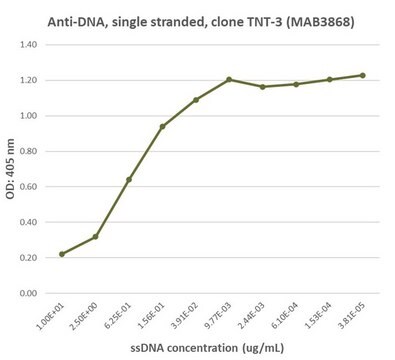SAB4300564
Anti-SMAD3 (Ab-208) antibody produced in rabbit
affinity isolated antibody
别名:
Anti-DKFZp586N0721 antibody produced in rabbit, Anti-DKFZp686J10186 antibody produced in rabbit, Anti-HSPC193 antibody produced in rabbit, Anti-HsT17436 antibody produced in rabbit, Anti-SMAD family member 3 antibody produced in rabbit
登录查看公司和协议定价
所有图片(2)
About This Item
分類程式碼代碼:
12352203
NACRES:
NA.41
推荐产品
生物源
rabbit
品質等級
共軛
unconjugated
抗體表格
affinity isolated antibody
抗體產品種類
primary antibodies
無性繁殖
polyclonal
形狀
buffered aqueous solution
分子量
~52 kDa
物種活性
rat, human, mouse
濃度
1 mg/mL
技術
immunohistochemistry (formalin-fixed, paraffin-embedded sections): 1:50-1:100
indirect immunofluorescence: 1:100-1:200
同型
IgG
免疫原序列
(N-L-S-P-N)
NCBI登錄號
UniProt登錄號
應用
research pathology
運輸包裝
wet ice
儲存溫度
−20°C
目標翻譯後修改
unmodified
基因資訊
human ... SMAD3(4088)
一般說明
SMAD3 (SMAD family member 3) is located on chromosome 15q22.
免疫原
Peptide sequence around aa. 206-210 (N-L-S-P-N), according to the protein SMAD3.
生化/生理作用
SMAD3 (SMAD family member 3) plays a major role in the intracellular signaling of transforming growth factorβ(TGFβ). Reducing the phosphorylation level of Smad3 helps autophagy to control endothelial-mesenchymal transition. In arterial smooth muscle cells, suppression of SMAD3 results in elevating cell viability.
特點和優勢
Evaluate our antibodies with complete peace of mind. If the antibody does not perform in your application, we will issue a full credit or replacement antibody. Learn more.
標靶描述
Smad3 encoded by this gene belongs to the SMAD, a family of proteins similar to the gene products of the Drosophila gene 'mothers against decapentaplegic' (Mad) and the C. elegans gene Sma. SMAD proteins are signal transducers and transcriptional modulators that mediate multiple signaling pathways. This protein functions as a transcriptional modulator activated by transforming growth factor-beta and is thought to play a role in the regulation of carcinogenesis.
外觀
Solution in phosphate-buffered saline containing 0.02% sodium azide and 50% glycerol
免責聲明
Unless otherwise stated in our catalog or other company documentation accompanying the product(s), our products are intended for research use only and are not to be used for any other purpose, which includes but is not limited to, unauthorized commercial uses, in vitro diagnostic uses, ex vivo or in vivo therapeutic uses or any type of consumption or application to humans or animals.
未找到合适的产品?
试试我们的产品选型工具.
儲存類別代碼
10 - Combustible liquids
水污染物質分類(WGK)
WGK 1
閃點(°F)
Not applicable
閃點(°C)
Not applicable
Direct binding of Smad3 and Smad4 to critical TGF beta-inducible elements in the promoter of human plasminogen activator inhibitor-type 1 gene
Dennler S, et al.
The Embo Journal, 17(11), 3091-3100 (1998)
Autophagy regulates Endothelial-Mesenchymal transition by decreasing the phosphorylation level of Smad3
Wang J, et al.
Biochemical and Biophysical Research Communications, 487(3), 740-747 (2017)
Functional Analysis of a Novel Genome-Wide Association Study Signal in SMAD3 That Confers Protection From Coronary Artery Disease
Turner AW, et al.
Arteriosclerosis, Thrombosis, and Vascular Biology, 36(5), 972-983 (2016)
Genetic risk factors for the development of allergic disease identified by genome-wide association
Portelli MA, et al.
Clinical and Experimental Allergy, 45(1), 21-31 (2015)
Lingfang Zeng et al.
Arteriosclerosis, thrombosis, and vascular biology, 35(10), 2134-2144 (2015-09-01)
Smooth muscle cell (SMC) migration and proliferation play an essential role in neointimal formation after vascular injury. In this study, we intended to investigate whether the X-box-binding protein 1 (XBP1) was involved in these processes. In vivo studies on femoral
我们的科学家团队拥有各种研究领域经验,包括生命科学、材料科学、化学合成、色谱、分析及许多其他领域.
联系技术服务部门